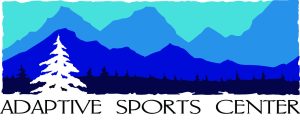The Adaptive Sports Center offers people with disabilities a chance to experience a variety of outdoor activities and sports
By Bill Huber
Kirsten Atkins was one of the original instructors at the Physically Challenged Ski Program of Crested Butte (Colo.) in 1987.
“I was 22 at the time,” she says. “I saw an ad in the paper for volunteers.”
Plenty has changed over the last three decades. That first winter, Atkins recalls the program conducting 33 ski lessons. In 1988, former President Jimmy Carter and his wife, Rosalynn, helped give the fledgling program a financial kick-start.
Over the past year, the aptly renamed Adaptive Sports Center provided about 6,000 outdoor activities to more than 1,000 visitors in programs ranging from skiing, snowboarding, ski biking, ice climbing and snowshoeing in winter to cross-country and downhill mountain biking, rock climbing, ropes courses, kayaking, canoeing, whitewater rafting, hiking and mountain climbing in the summer.
“When we started in 1987, we were in a teeny little closet without very much equipment,” says Atkins, who is a member of the U.S. Disabled Snow Sports Hall of Fame. “I’ve been fortunate to be part of the program growing and the technology. The technology has advanced in amazing ways. There’s all kind of things we can do now that we couldn’t do then.”
Changing Lives
The Adaptive Sports Center is located at the base of the ski area at Crested Butte Mountain Resort. It caters to people with a wide range of physical, emotional and cognitive disabilities, whether it’s guiding a child down the ski hill or leading a group of veterans up a 14,000-foot mountain peak.
“What we think differentiates us from other organizations is every lesson that we take people out on is led by a paid instructor that is highly trained in working with people with disabilities,” says Brian Barker, the Adaptive Sports Center’s marketing manager.
Many of those instructors have earned certified therapeutic recreational specialist credentials.
The Adaptive Sports Center handles individual visits as well as group trips from hospitals ranging from Walter Reed National Military Medical Center in Bethesda, Md., to the Kennedy Krieger Institute, which focuses on children with pediatric developmental disabilities and disorders of the brain, spinal cord and musculoskeletal system, in Baltimore.
“Let’s say you’re a physical therapist and you want to bring a group of participants on a trip. We will help you schedule everything from air transport to ground transportation to lodging. That’s our specialty,” Barker says.
One family who’s been touched deeply by the Adaptive Sports Center is the Dryers. Mitch Dryer was a firefighter for the city of Oneida, N.Y., and served in the New York State Air National Guard. While fighting a fire in April 2007, the building collapsed. He was burned so severely that it resulted in the amputation of his right arm. In 2011, he attended the World Burn Congress in Galveston, Texas, and visited an Adaptive Sports booth. The following year, he joined a group on a trip to Crested Butte.
“I was unable to go back to work as a firefighter,” he says. “I’ve always been in the physical culture. I like to work out and play sports, so it was hard for me being incapacitated. Skiing was something that I never had any interest in. It was one of those things that I wasn’t exposed to. I think the biggest thing for me was the exposure.”
The Adaptive Sports Center hasn’t only changed Dryer’s life. A father of twins, Dryer has a daughter named Emeri, who was stricken by a staph infection when she was 1 month old. An abscess developed on her spine and damaged her spinal cord, leaving her an incomplete paraplegic. While on his second trip to Adaptive Sports, some friends purchased a scholarship for Emeri to attend.
In 2015, due in part to Adaptive Sports, the family moved to Crested Butte.
“When we moved here, she wanted to go zip lining,” Dryer recalls of 8-year-old Emeri, who was 4 when she first participated in Adaptive Sports’ activities. “For the first two or three months before we had time to squeeze that in, that’s all she talked about was going zip lining. Just the smile and laughter that you got out of her, it was a sight to see … It’s given her a sense of normalcy that she can do the same things as her brother does. She might do them a little differently, obviously, but she’s able to go out and ski. She’s able to do all kinds of other activities.”
The center touched the family’s lives to such an extent that Dryer and his wife, Aimee, have become volunteers there.
“Now, I’ve seen both sides of it,” Dryer says. “I’ve seen what it’s done for me and Emeri and the rest of my family. Now, I get to experience other people taking advantage of it. Seeing somebody who’s new to skiing, doesn’t spend a lot of time outdoors doing anything physical, through the course of a few days or a week with a group, just to see their growth and the changes in them emotionally are huge.”
For more information on the Adaptive Sports Center, visit adaptivesports.org.


